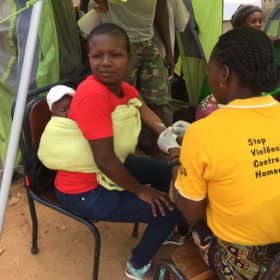Delivery of Health and Social Services to Vulnerable Communities in Mozambique
 The estimated HIV adult prevalence rate in Manica, Mozambique, is 13.5% (IMASIDA). Among other things, the presence of a heavily trafficked border post contributes to Manica’s high HIV prevalence rate. Mobile populations pose unique challenges to HIV prevention and response efforts due to their transient lifestyles. In addition, poverty drives women and girls to become sex workers at the stopover point, which increases all groups’ susceptibility to HIV infection and to a high number of OVC.
The estimated HIV adult prevalence rate in Manica, Mozambique, is 13.5% (IMASIDA). Among other things, the presence of a heavily trafficked border post contributes to Manica’s high HIV prevalence rate. Mobile populations pose unique challenges to HIV prevention and response efforts due to their transient lifestyles. In addition, poverty drives women and girls to become sex workers at the stopover point, which increases all groups’ susceptibility to HIV infection and to a high number of OVC.
Many of these populations are also likely to be gender-based violence (GBV) perpetrators and victims. For example, female informal traders who smuggle their goods across the border or illegally cross the border are alleged to suffer from sexual harassment, assaults, and rape, especially if they fail to pay bribes to the police border patrols or other authoritative groups. Unfortunately, most of these cases are not reported due to fear, lack of information and knowledge.
“I’m impressed with the One Stop Shop. Such an event forced department heads to leave their air-conditioned offices to be on the ground and it provided services directly to the communities. This is the way to go.” -Tiago Jaime, Executive Director, ANDA
Furthermore, the majority of the permanent residents of Machipanda are impoverished and the transportation fee requirements and money to pay for services prevent them from accessing basic social services. Even when they do make it to service centers, many community members, especially youth, allege poor quality service delivery, and youth rarely make an effort to receive sexual and reproductive health services because of the lack of youth-friendly services. In 2016, 20 girls from Machipanda Secondary School dropped out of school due to unwanted pregnancies.
“I did not know that this is possible to get all these services I need without paying any fees. I got GBV and HIV screening, family planning advice, and the birth registration for my two children!” – Patience, 23
To help improve service delivery, WEI/Bantwana—along with co-sponsors, local partners, and local organizations—mobilized 5,675 community members of Machipanda border post to take part in Mobile One-Stop Service delivery held from the 27th to 29th of September 2017. Priority populations, including hard-to-reach girls, domestic and sex workers, teenage girls with babies, school-dropouts, as well as adolescent girls and young women as well as PLWHA mostly survivors of GBV in Machipanda border post, participated in the event.
What is One-Stop Service Delivery? One-Stop service delivery is a ground-breaking technique of bringing multiple, needed health and social services in a layered fashion, to vulnerable communities.
In addition to delivering quality and timely services under one roof and at the door-step of communities, the Mobile One-Stop Service provision is a great entry point to deliver and provide follow-up support and multi-sectoral services in an integrated fashion. School-related GBV information and services comprised 32% of the total 2,536 services, and generated demand meant to increase the uptake of services for all community members, including the most at-risk subgroups.
This initiative was a part of the USAID-funded Força à Comunidade e Crianças (FCC) project. Through FCC, we aim to reduce the socioeconomic impact of HIV and AIDS on orphans and vulnerable children and their caregivers.
